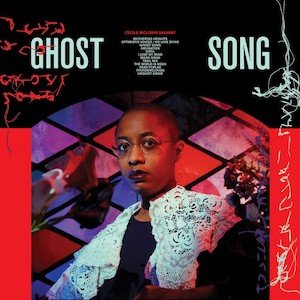Label: Nonesuch Records, 2022
Personnel - Cécile McLorin Salvant: vocals, piano; Paul Sikivie: electric and acoustic bass, synth; Sullivan Fortner: piano, Fender Rhodes, vocals; Alexa Tarantino: flute; Aaron Diehl: piano, pipe organ; Marvin Sewell: guitar; James Chirillo; banjo; Daniel Swenberg: lute; Burniss Travis: bass; Kyle Poole: drums; Keita Ogawa: percussion.
The classically trained jazz singer and composer Cécile McLorin Salvant, a three-Grammy winner and McArthur fellow, puts together a top-shelf diamond of a record that comes replete with memorable songs. Seven of her originals and five renditions of tunes (both jazz and non-jazz) are included in a track list whose sequence really works. Revealing a diversity of influences and a fearless risk-taking approach, she excels on this album, counting on the unconditional support of a talented crew of musicians.
Kate Bush’s '80s art-pop hit “Wuthering Heights” leads off the set, being tackled with undeniable virtuosity. Salvant begins this impeccable version with a sean-nós singing (traditional Irish solo style), being magnificently accompanied in the chorus by the bassist Paul Sikivie, who also plays synth. This inspiring opener takes us to another grandiose moment: “Optimistic Voices/No Love Dying”, a conjunction of Stothart/Arlen’s composition for the film The Wizard of Oz and Gregory Porter’s soulful opening track of his 2013 album Liquid Spirit. The treatment given to these pieces is wonderfully innovative, with the former deftly interspersing ragtime banjo and avant-garde slices, whereas the latter, marked by a deliciously slow old-school boom-bap beat, has Alexa Tarantino’s sinuous flute appearing between vocal lines.
Both “Obligation”, an original by the singer, and “The World is Mean”, which was taken from Kurt Weill/Bertolt Brecht’s 1928 musical play The Threepenny Opera, are theatrically jazzy. The latter keeps effortlessly shifting in tempo, texture and mood, ending up oozing a tango feel. Salvant’s “Ghost Song” mixes Americana and R&B elements, sounding like a bluesy work song and featuring the Brooklyn Youth Chorus (in its final section), keyboardist Sullivan Fortner on Rhodes and guitarist Marvin Sewell on the steel-string acoustic guitar. Velvety guitar-piano layers are also discernible on “Thunderclouds”, which, despite the title, is tenderly and optimistically narrated by the bandleader. She also penned the brushed jazz ballad “Moon Song”, whose balmy sweetness contrasts with the pandemic-driven tension of its predecessor, “I Lost My Mind”. Here’s an attempt at getting out of the dark with haunting staccato repetitions of an odd-meter vocal riff supplemented by Aaron Diehl’s prophetic pipe organ.
You get the notion that Salvant can embrace any song she wants with glow and singularity after listening to “Until”, a medium-fast waltz by Sting, which here begins rubato and later recalls Brazilian choro thanks to the work of percussionist Keita Ogawa and banjo player James Chirillo. Without stretching the duration of the songs and putting her lyrical melodies in perpetual motion, Salvant has in Ghost Song a work of ardent ambition and a career highlight.
Favorite Tracks:
01 - Wuthering Heights ► 02 - Optimistic Voices/No Love Dying ► 05 - Until


